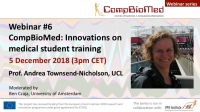
The upcoming webinar will be presented by University College London and is scheduled for 5 December 2018. This is the 6th of a series of webinars that the CompBioMed Centre of Excellence organises in collaboration with the VPH Institute.
The ability to create patient-specific therapeutic treatments is a tantalising prospect in healthcare provision in the 21st century. To achieve this, it is necessary to use supercomputers to model many of the complex structures and systems of our bodies. One system is the human microbiome – the microbial communities that we carry with us in or on our bodies – and the role that these bacteria play in health and disease. In this webinar, UCL will present the course that they have developed and been delivering to medical students to teach them how to use state of the art laboratory and computational resources to detect their individual skin microbiomes and assess whether there is any association between microbiome composition and shared environmental factors.
Prof. Andrea Townsend-Nicholson (UCL) holds a chair in Biochemistry & Molecular Biology in the Division of Biosciences (Structural & Molecular Biology) at University College London. She obtained her doctorate in Cellular and Molecular Biology from the Université Louis Pasteur (Strasbourg, France) in 1990. From 1991 to 1996, she left transcriptional studies to pursue cell signalling, studying mammalian G protein-coupled receptors as a postdoctoral fellow in the Neurobiology Division of the Garvan Institute of Medical Research (Sydney, Australia). Having started her research career at the University of Toronto in Canada, she was appointed in 2001 as a member of academic staff at UCL in the Department of Biochemistry & Molecular Biology, following three and a half years of postdoctoral study in UCL's Department of Anatomy & Developmental Biology and eighteen months as a British Heart Foundation Research Fellow in the Department of Physiology
Register here